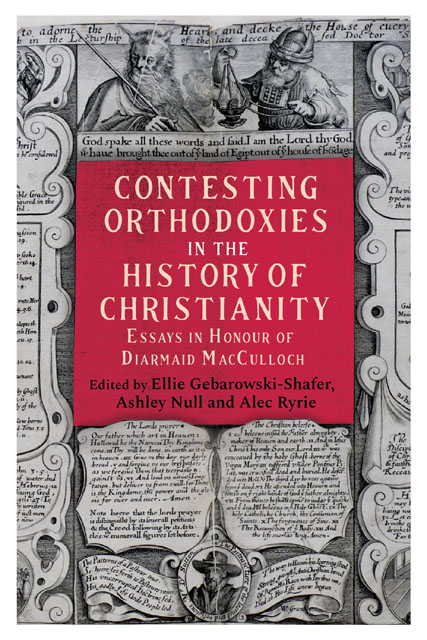Book contents
- Frontmatter
- Contents
- List of Illustrations
- List of Contributors
- List of Abbreviations
- Introduction
- 1 ‘Jewish Christianity’ in Antiquity: Meaningless Category or Heuristic Irritant?
- 2 ‘Sola Fide’: the Wrong Slogan?
- 3 Both Cromwellian and Augustinian: the Influence of Thomas Cromwell on Reform within the Early Modern English Austin Friars
- 4 Lex, Rex and Sex: The Bigamy of Philipp of Hesse and the Lutheran Recourse to Natural Law
- 5 The Authority of Scripture in Reformation Anglicanism: Then and Now
- 6 Orthodoxy and Heresy in the Post-Reformation
- 7 Profanity and Piety in the Church Porch: the Place of Transgression in Early Modern England
- 8 Writing on the Walls: Word and Image in the Post-Reformation English Church
- 9 The Myth of the Church of England
- 10 Mysticism, Orthodoxy and Reformed Identity before the English Revolution: the Case of John Everard
- 11 Sacrilege and the Sacred in England’s Second Reformation, 1640–1660
- 12 ‘I had not the patience to be quiet’: Arthur Bury and The Naked Gospel
- 13 ‘A soul-corrupting indifferentism’: the Intellectual Development of Benjamin Henry Latrobe
- 14 Newman, Dogma and Freedom in the Church
- 15 ‘Tommy, ’ow’s yer soul?’ Reconsidering Religion and the British Soldier
- 16 The King James Vulgate
- 17 The Myth of the Anglican Communion?
- Select bibliography of Diarmaid MacCulloch’s scholarly publications
- Bibliography
- Index
- Tabula Gratulatoria
- Studies in Modern British Religious History
4 - Lex, Rex and Sex: The Bigamy of Philipp of Hesse and the Lutheran Recourse to Natural Law
Published online by Cambridge University Press: 09 January 2024
- Frontmatter
- Contents
- List of Illustrations
- List of Contributors
- List of Abbreviations
- Introduction
- 1 ‘Jewish Christianity’ in Antiquity: Meaningless Category or Heuristic Irritant?
- 2 ‘Sola Fide’: the Wrong Slogan?
- 3 Both Cromwellian and Augustinian: the Influence of Thomas Cromwell on Reform within the Early Modern English Austin Friars
- 4 Lex, Rex and Sex: The Bigamy of Philipp of Hesse and the Lutheran Recourse to Natural Law
- 5 The Authority of Scripture in Reformation Anglicanism: Then and Now
- 6 Orthodoxy and Heresy in the Post-Reformation
- 7 Profanity and Piety in the Church Porch: the Place of Transgression in Early Modern England
- 8 Writing on the Walls: Word and Image in the Post-Reformation English Church
- 9 The Myth of the Church of England
- 10 Mysticism, Orthodoxy and Reformed Identity before the English Revolution: the Case of John Everard
- 11 Sacrilege and the Sacred in England’s Second Reformation, 1640–1660
- 12 ‘I had not the patience to be quiet’: Arthur Bury and The Naked Gospel
- 13 ‘A soul-corrupting indifferentism’: the Intellectual Development of Benjamin Henry Latrobe
- 14 Newman, Dogma and Freedom in the Church
- 15 ‘Tommy, ’ow’s yer soul?’ Reconsidering Religion and the British Soldier
- 16 The King James Vulgate
- 17 The Myth of the Anglican Communion?
- Select bibliography of Diarmaid MacCulloch’s scholarly publications
- Bibliography
- Index
- Tabula Gratulatoria
- Studies in Modern British Religious History
Summary
This essay looks at one of the perennial sites of conflict over both orthodoxy and orthopraxy: the regulation of sexual morals, which brings both issues to a sharp point. The essay considers how the notorious scandal around the bigamy of the Lutheran prince Philipp of Hesse in 1539–40 placed emerging Lutheran understandings of orthodoxy under excruciating pressure. In this new world, where long-settled doctrines were suddenly open to negotiation, it was not entirely unreasonable of Philipp and his supporters to appeal to the ambiguous biblical evidence and to question whether Christianity necessarily entailed monogamy. At the moment of the crisis, the blunt realities of power politics pushed Martin Luther in the same direction. Yet, over the decades that followed, those same blunt realities meant that Lutheranism had to be seen to reaffirm traditional sexual orthodoxies. Even if theologians’ conservative instincts had not tended this way in any case, the risk of reputational damage from not disavowing Philipp’s adventures was intolerable. The result was the reverse-engineering of a distinctive theological method: since sola scriptura could not be relied on to provide a sufficiently unambiguous answer to the question of polygamy, Lutherans in the so-called age of orthodoxy turned to natural law instead.
The sixteenth-century scandal of Landgrave Philipp of Hesse’s bigamy, Martin Luther’s assent to it and the presumed implications of both have never wanted for attention. When even those sympathetic to him note that, ‘clearly, Luther departs from tradition’ in his counsel to Philipp, and when that departure is regularly described as the ‘greatest stain’ and ‘darkest spot’ on the history of the Reformation, it can be no surprise that the affair would become ‘a godsend to the enemies of Luther’. This would become the case, however, not simply because it could be used to impugn Luther himself, but also and especially because it served as a rhetorically persuasive example of the more fundamental dangers lurking in the ‘formal principle’ of the broader evangelical movement, the doctrine of sola scriptura. As John Witte rightly notes, such a scandal was, for Roman polemicists, ‘precisely the kind of social and moral fallout to be expected from Martin Luther’s heretical rantings and his simple-minded calls for the priesthood of all believers to live by the Bible alone’.
- Type
- Chapter
- Information
- Contesting Orthodoxies in the History of ChristianityEssays in Honour of Diarmaid MacCulloch, pp. 56 - 76Publisher: Boydell & BrewerPrint publication year: 2021



